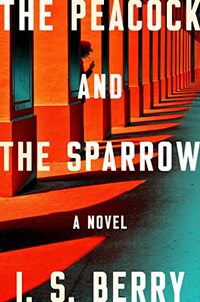The Peacock and the Sparrow by I.S. Berry
 Wednesday, May 31, 2023 at 6:07AM
Wednesday, May 31, 2023 at 6:07AM 
Published by Atria Books on May 30, 2023
Spy novels are fundamentally about the betrayal of trust. The strategy of spying dictates that it is dangerous to trust. Yet spies must be trusted by their sources or the sources will not divulge valuable information. Determining the trustworthiness of sources and the information they provide is part of the espionage game. The Peacock and the Sparrow explores the difficulty of winning the game when spies base their assessment of trustworthiness on what politicians want to hear.
Shane Collins is an aging spy who has been posted to Bahrain. He is there in 2012, surrounded by rumors of the Arab Spring. Collins spends most of his time drinking, but he’s developed a source named Naqid. Collins trusts Naqid. The reader will wonder whether Collins is being played.
Collins’ head of station, Whitney Alden Mitchell, is the youngest station chief in CIA history. Mitchell has a strong sense of what his bosses want to hear. He specializes in giving them intelligence that makes them happy and assessing intelligence as unworthy of belief if his bosses won’t want to believe it.
Naqid is a member of “the opposition.” The opposition makes a nuisance of itself, throwing the occasional Molotov cocktail, as it protests the royals who govern Bahrain. There is good reason to protest the royals, as they have no regard for human rights. Yet the US supports them because the US perceives the enemy to be Iran and Bahrain is the enemy of that enemy. On the other hand, the opposition views westerners as infidels, despite Naqid’s apparent friendship with Collins.
A series of minor bombs near coffee shops frequented by Americans are blamed on the opposition. Mitchell has been told that the explosives were provided by Iran. Naqid tells Collins that the bombs were planted by the royals to win support from the Americans, including the lifting of sanctions so Bahrain can better respond to terrorist threats. Mitchell dismisses Naqid’s report because it isn’t what his bosses will want to hear. Could Naqid be telling the truth? Collins believes that what he’s saying makes a certain amount of sense.
The novel raises profound questions about whose side the US should take in the Middle East, or whether the US should be taking sides at all. Certainly, there’s truth in Naqid’s complaints that the ruling family suppresses dissenting voices and tortures prisoners, but the US is unreasonably tolerant of human rights violations that are committed by its allies. By the end of the story, it becomes clear that the opposition’s revolution will not be a favorable replacement for the ruling family. Sharia law is enforced overnight: assaults on liquor store owners, the imposition of strict dress codes, brothels burned, gay men shot, lawyers arrested. American expats who enjoyed cheap rent and cheaper sex are lining up to be evacuated. The CIA is shredding documents before the Embassy is overrun.
The plot follows Collins as he does some remarkably stupid things to assist Naqid, including dumping a dead body and picking up a package in Cambodia. Collins also continues a relationship with an artist named Almaisa after the CIA tells him she’s a security risk who needs to be kept at a distance. Why Collins makes such poor choices might be attributed to the fog of alcohol through which he perceives the world, although we don’t learn his true motivation for becoming the opposition’s courier until the novel’s end.
The Peacock and the Sparrow is unlike most spy novels in that the first-person narrator is not only unreliable but a poor excuse for a human being. Collins’ unreliability pertains to his inability to acknowledge his weaknesses. He drinks too much but denies his alcoholism. He justifies harmful acts by telling himself “I couldn’t have known.” He even asks himself, “What is knowledge?” Do we really know what we know? Collins indulges in philosophy to make his betrayals abstract and less important.
Collins’ first sexual encounter with Almaisa is pretty clearly a rape (he tears off her dress and apparently regards submission as consent) but, while he entertains a moment’s regret, he quickly convinces himself that he did nothing wrong. He meets women in brothels to confirm information he’s been given and, for no operational benefit, sleeps with them on the taxpayer’s dime. He punches Mitchell in the face, which clearly isn’t a wise career move. He tells himself he’s a good spy, but his tradecraft is lax (he doesn’t see a man who hits him on the head and robs him). He puts his hand on a gun that was used to shoot someone, one of several acts that potentially create incriminating evidence that could be used against him.
Collins’ paranoia seems to be sending him off the deep end. Is he being followed? Did someone break into his hotel room and search his luggage? Is Mitchell sleeping with Almaisa behind his back? All those things could be true, but they might be the alcohol-fueled imaginings of a mind that has lived too long in the darkness of espionage. The truth is not always clear, to either the reader or Collins, although most mysteries are resolved in the closing pages. A final twist sheds some light on who the novel’s greatest betrayer might be.
The novel builds tension as it nears its climax, particularly when Collins crosses borders and encounters checkpoints. Strong characterization is supported by observant prose and a grim but authentic sense of atmosphere in Bahrain and Cambodia. Collins isn’t likable but his messy life and dangerous liaisons are fascinating. The Peacock and the Sparrow is a skillful blend of history and fiction. It will certainly be among the best spy novels I’ll read this year.
RECOMMENDED
Reader Comments